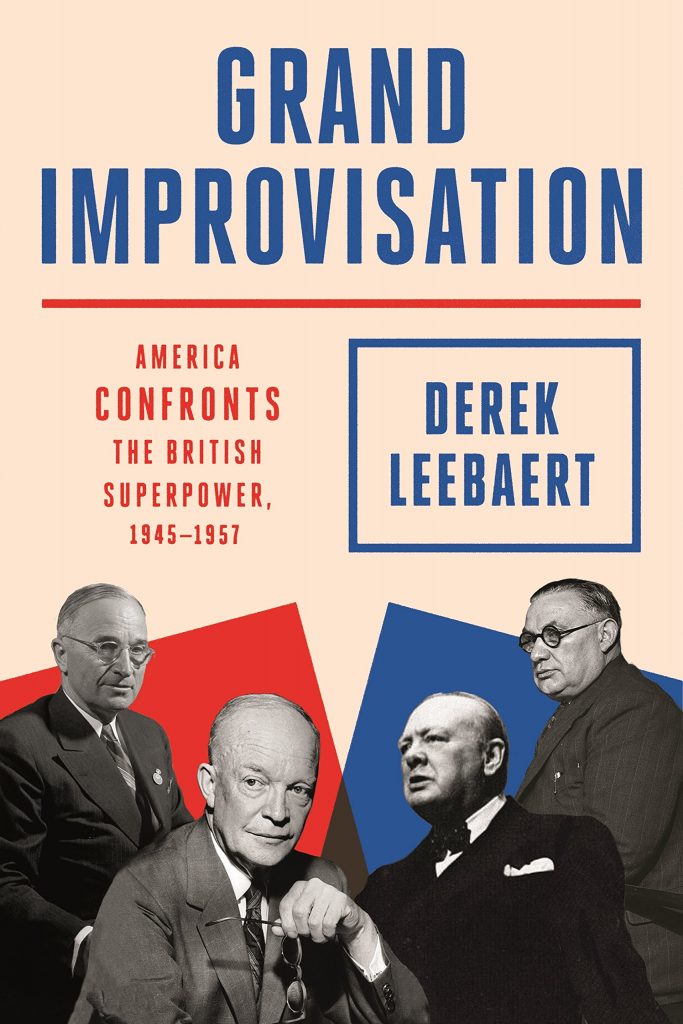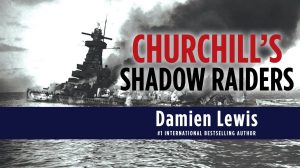
Bulletin #144 – Jun 2020
The Turn of the Tide

May 31, 2020
Review by LEON J. WASZAK
Derek Leebaert, Grand Improvisation: America Confronts the British Superpower, 1945–1957, Farrar, Straus and Giroux, 2019, 612 pages, $35.00. ISBN–978-0374250720
It was not so long ago that the world (as we now know it) began taking shape. The Second World War was in the process of concluding, and many of the successful movers and shakers of the time had not yet grasped the changes that were in store. Euphoria over the “great victory” clouded their judgment. At the close of the war, many remained fixated on the concept of “the Big Three,” the belief that the British Empire was still a capable player and co-equal partner with the much stronger “superpowers” of the United States and the Soviet Union.
However strong the conventions of 1945, subsequent developments revealed Britain to be much weaker than many could accept. American leaders, not yet confident of their nation’s new role as the principal defender of western democracy, initially looked to the British for guidance. That Britain thus assumed a role in animating US policy for the remainder of the 1940s and well into the late 1950s is the focus of a new study that author and historian Derek Leebaert, a former professor at Georgetown University and author of several previous books on international politics, calls the “Grand Improvisation.”
Winston Churchill’s “Iron Curtain” speech in 1946 is viewed by Leebaert as a symbolic “passing of the torch,” when the gravity of responsibility started to shift from Britain to the US. This was not, however, a cut-and-dry a departure. The speech was not widely appreciated at the time on either side of the so-called “special relationship.” Many Americans thought that Britain sought to drag the US into yet another foreign entanglement while British Foreign Minister Ernest Bevin attacked Churchill, who had been voted out of office less than a year before, as a dangerous egotist and manipulator: “E thinks’ e’s Prime Minister of the world.” Nevertheless, within a few years, the North Atlantic Treaty Organization (NATO), which Churchill more or less an advocated, had been created.

2024 International Churchill Conference
NATO not notwithstanding, the relationship between Britain and the United States was becoming more complicated and led to serious disagreements over a wide range of interests from the Middle East to China, Latin America, and Southeast Asia. The British, for example, were reluctant to commit large numbers of troops to the Korean War in 1950 because they felt exposed in Hong Kong and Singapore and, by extension, in the Middle East. As the war in Korea expanded to include China, the British urged caution and direct negotiations with Mao Zedong, whose ascension to power in 1949 the US refused to recognize but which Britain accepted from the onset. The British also shared a concern that a major setback on the Korean peninsula—or worse, a general war resulting from it—might embolden Joseph Stalin to attack British interests in the Middle East. General Douglas MacArthur, famously citing the unwelcomed “interference” of the British Foreign Office, fed this rift when President Truman dismissed him as Supreme Commander in Korea.
Churchill’s return to power in October 1951 by no means meant that Anglo-American relations were soon to improve. Many observers at the time believed that the election of Eisenhower in 1952 would usher in better coordination between the two “English-speaking” nations on a wide variety of international issues given the long-established wartime relationship between Churchill and Ike. In fact the divisions grew deeper, and the resentments became more evident, although these were not always seen in public.
The divisions became manifest over dealings with the Nasser regime in Egypt and the CIA-led coup against the so-called “Communist leaning” Arbenz of Guatemala. In this last instance, the British saw US action as similar to North Korea’s aggression against the South and recommended UN observers be sent to the region to sort things out. Eisenhower, however, saw this as interference in America’s backyard and came to feel that the he was “being too damned nice to the British” and needed to “give them a lesson.”
Differences over Guatemala in 1954 became symptomatic of a greater disconnect. The British felt that they had a “moral role” to play in the world in the interest of stability while the US charted a new course in foreign affairs following the direction of Eisenhower’s Secretary of State John Foster Dulles. To combat the spread of Communism, Dulles began initiatives in places once reserved for the British like the Middle East and Southeast Asia. From the US point of view, the British were a bundle of contradictions—an imperial power in decline subject to US financial underwriting yet having the audacity to assume an aura of “moral superiority” over the Americans who were paying their bills. This moral position was compromised when Britain colluded with France and Israel to strike at Egypt in the Suez Crisis. Eisenhower’s opposition to “Operation Musketeer” resulted in the diminishment of both Britain and France as world powers. Leebaert observes that Ike’s Vice President, Richard Nixon, saw fit to issue a “declaration of independence” from British authority. Eisenhower had delivered his “lesson.”
This is history in the grand manner and with dramatic flair. Leebaert must be commended for producing a first-class study that is sure to be the definitive account of these transformative years for some time. The result of his efforts is a well-balanced, judicious, often compelling, and surprisingly flowing narrative despite the lengthy 600-plus pages. Leebaert’s book is a must read for all Churchillians and those who want to know more (in detail) about Anglo-American relations during the early Cold War period.
Leon J. Waszak teaches at Cerritos College and is author of Agreement in Principle: The Wartime Partnership of Wladyslaw Sikorski and Winston Churchill (1996).
Subscribe
WANT MORE?
Get the Churchill Bulletin delivered to your inbox once a month.




